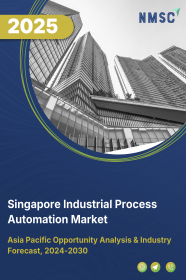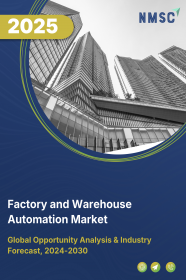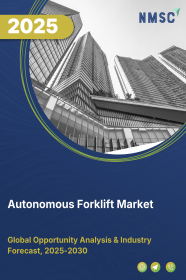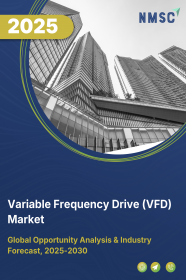
Singapore Industrial Process Automation Market by Component (MES [Hardware, Software, Services]; DCS [Hardware, Software, Services]; PLC [Hardware, Software, Services]; SCADA [Hardware, Software, Services]; Field Instruments; Industrial Robots; Human Machine Interface; Industrial PCs; Process Analyzers & Drives) and by End User (Oil & Gas, Chemicals & Refining, Energy & Power, Pulp & Paper, Metals & Mining, Pharma, & Others) – Country Opportunity Analysis and Industry Forecast, 2025–2030
Industry: Semiconductor & Electronics | Publish Date: 14-Oct-2025 | No of Pages: 160 | No. of Tables: 121 | No. of Figures: 66 | Format: PDF | Report Code : SE1001
Industry Outlook
The Singapore Industrial Process Automation Market size was valued at USD 431.2 million in 2024 and is projected to grow to USD 474.9 million by 2025. Additionally, the industry is expected to continue its growth trajectory, reaching USD 681 million by 2030, at a CAGR of 7.91% from 2025 to 2030.
The adoption of robots in Singapore’s manufacturing sector is accelerating industrial process automation by improving efficiency, reducing human error, and enabling faster production cycles. At the same time, the expanding oil sector is driving automation demand through applications in exploration, drilling, and refining, enhancing operational precision, safety, and reliability.
However, integrating new automation technologies with existing legacy systems remains a challenge, slowing adoption and overall growth. The integration of artificial intelligence (AI) and machine learning (ML) presents significant opportunities, enabling predictive maintenance, real-time monitoring, and intelligent decision-making, thereby boosting productivity, optimizing resource utilization, and supporting scalable automation across manufacturing and oil sectors.
Deployment of Robots in Manufacturing Drives Market Growth
The adoption of robots in Singapore’s manufacturing sector accelerates the industrial process automation market by enhancing operational efficiency, minimizing human error, and enabling faster production cycles. According to the 2024 International Federation of Robotics (IFR), Singapore’s robot density reached 770 units per 10,000 employees in 2023. The growing integration of robotics improves precision, streamlines workflows, and strengthens productivity, driving widespread adoption of automation technologies across industries.
Expansion of the Oil Sector Boosts Automation Demand
The oil sector in Singapore fuels market growth through increasing demand for operational efficiency, safety, and precision. Automation technologies are implemented in exploration, drilling, and refining processes to optimize production, reduce operational costs, and mitigate human errors. The rising adoption of automation in the oil industry enhances overall efficiency and reliability, further propelling market expansion.
Complexity in Integrating Automation with Existing Systems Hinders Growth
The integration of new automation technologies with legacy systems remains a significant challenge in Singapore. Businesses face difficulties aligning modern automation solutions with existing infrastructure, resulting in delayed adoption and slower overall market growth.
Integration of AI and Machine Learning Supports Smarter Automation
The integration of artificial intelligence (AI) and machine learning (ML) presents a major growth opportunity for the Singapore industrial process automation market trends. AI and ML enable predictive maintenance, real-time process monitoring, and intelligent decision-making, improving efficiency and reducing errors. Leveraging these technologies allows industries to enhance productivity, optimize resource utilization, and scale automation solutions effectively across manufacturing and oil sectors.
Competitive Landscape
The promising players operating in the Singapore industrial process automation industry include Siemens AG, Emerson Electric Co., ABB Ltd, Honeywell International Inc., Schneider Electric SE, Yokogawa Electric Corporation, Rockwell Automation, Inc., Mitsubishi Electric Corporation, Endress+Hauser AG, KROHNE Messtechnik GmbH, Phoenix Contact GmbH & Co. KG, Valmet Oyj, Hitachi, Ltd., Fuji Electric Co., Ltd., and VEGA Grieshaber KGand Others.
Singapore Industrial Process Automation Market Key Segments
By Component
-
Manufacturing Execution Systems (MES)
-
Hardware
-
Software
-
Services
-
-
Distributed Control Systems (DCS)
-
Hardware
-
Software
-
Services
-
-
Programmable Logic Control (PLC)
-
Hardware
-
Software
-
Services
-
-
Supervisory Control and Data Acquisition (SCADA)
-
Hardware
-
Software
-
Services
-
-
Field Instruments
-
Industrial Robots
-
Human Machine Interface (HMI)
-
Industrial PCs
-
Process Analyzers and Drives
By End User
-
Oil and Gas
-
Chemicals and Refining
-
Energy and Power
-
Pulp and Paper
-
Metals and Mining
-
Pharma
-
Cement & Glass
-
Others
Key Players
-
Siemens AG
-
ABB Ltd
-
Honeywell International Inc.
-
Schneider Electric SE
-
Yokogawa Electric Corporation
-
Mitsubishi Electric Corporation
-
Endress+Hauser AG
-
KROHNE Messtechnik GmbH
-
Phoenix Contact GmbH & Co. KG
-
Valmet Oyj
-
Hitachi, Ltd.
-
Fuji Electric Co., Ltd.
-
VEGA Grieshaber KG
Report Scope and Segmentation
|
Parameters |
Details |
|
Market Size Value in 2025 |
USD 474.9 million |
|
Revenue Forecast in 2030 |
USD 681 million |
|
Value Growth Rate |
CAGR of 7.91%from 2025 to 2030 |
|
Analysis Period |
2024–2030 |
|
Base Year Considered |
2024 |
|
Forecast Period |
2025–2030 |
|
Market Size Estimation |
Million (USD) |
|
Growth Factors |
|
|
Companies Profiled |
15 |
|
Market Share |
Available for 10 companies |
|
Customization Scope |
Free customization (equivalent to up to 80 working hours of analysts) after purchase. Addition or alteration to country, regional, and segment scope. |
|
Pricing and Purchase Options |
Avail customized purchase options to meet your exact research needs. |

















 Speak to Our Analyst
Speak to Our Analyst
























